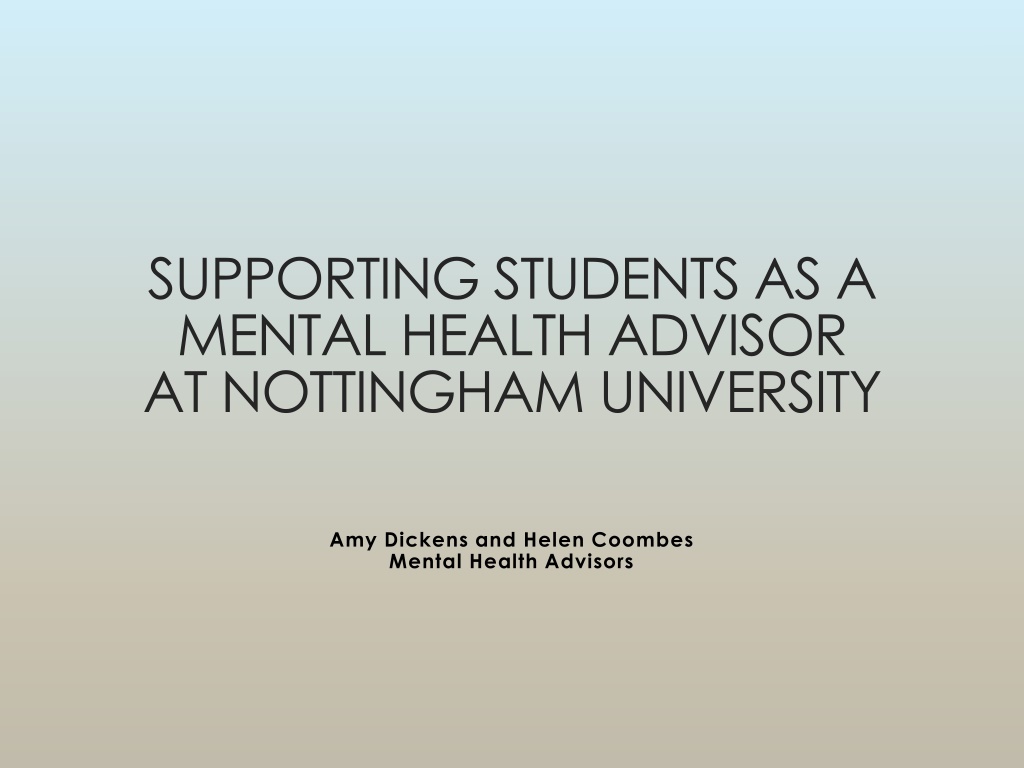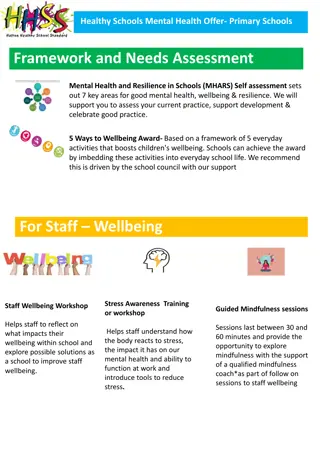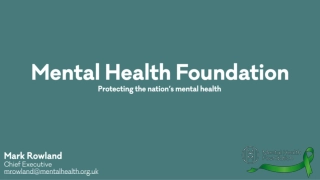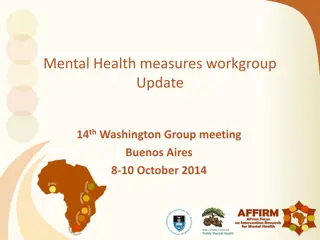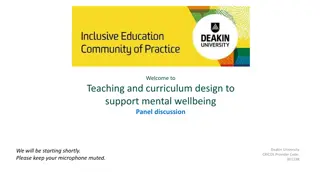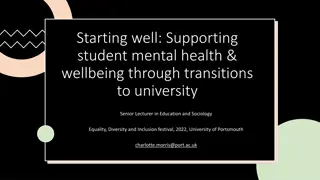Supporting Students' Mental Health at Nottingham University: Challenges and Strategies
Addressing the increasing demand for mental health support among university students, this article discusses the prevalence of mental health issues, vulnerabilities students face during the transition to independent living, and continued challenges such as drug use, social pressures, and academic stress. The role of mental health advisors Amy Dickens and Helen Coombes at Nottingham University is highlighted, emphasizing the importance of awareness, understanding, and accessible services for student well-being.
Download Presentation

Please find below an Image/Link to download the presentation.
The content on the website is provided AS IS for your information and personal use only. It may not be sold, licensed, or shared on other websites without obtaining consent from the author. Download presentation by click this link. If you encounter any issues during the download, it is possible that the publisher has removed the file from their server.
E N D
Presentation Transcript
SUPPORTING STUDENTS AS A MENTAL HEALTH ADVISOR AT NOTTINGHAM UNIVERSITY Amy Dickens and Helen Coombes Mental Health Advisors
Introductions Amy Dickens: Trained at the University of Derby, qualifying in 2005. Worked in the NHS for ten years. Started in this role in February 2016. Currently working 19.5 hours a week. Particular interests: training (MHFT) Helen Coombes: Trained at the University of Derby, qualifying in 2010. Worked in IAPT services for 3.5 years, before joining the team in August 2014. Currently working 26 hours a week. Particular interests: social inclusion.
Student Mental Health - Prevalence Growth in demand or also in need over time? Half of school leavers now attending university (Universities UK, 2018) Greater awareness and understanding of mental health? A reduced level of stigma around accessing services, therefore greater numbers accessing Perceptions by NHS and general public: awareness increasing that students can have poor mental health? Concerns and expectations of students and parents ONS (2018): small increase in student suicides July 2016 July 2017 (a total of 95 in England and Wales), but unclear whether this is statistically significant. Higher rate for males and mature students. Despite extensive media coverage, students appear to be at lower risk than general population of similar ages.
Vulnerabilities Transition to independent living: life skills? Activities of daily living, Emotional maturity? Cultural aspects: international students, mature students, widening participation (Imposter Syndrome), language barriers Social pressures: Seen as a positive route to take, to remain in step with peers and have constructive focus, even if health is poor? Anxiety around competitiveness in employment market versus debt accrued and time spent. Will it be worthwhile? Age, life stage onset often before age of 25 (IPPR, 2017), relapse
Vulnerabilities Continued Drug and alcohol use/other lifestyle-related exploration/experimentation. Environmental considerations (away from support network, unfamiliar place), campus living (intensity) Social aspects (attachment issues or other interpersonal challenges, greater ethnic and cultural diversity) Russell Group universities: particular challenges? hot housing ? perfectionism? Self esteem closely reliant on good academic outcomes? pushy parents? Learning methods and assessments Cuts to services eg camhs
Drivers for university-based mental health provision Legislation for example the Equality Act 2010: students with complex and severe difficulties need protection from discrimination (even unwittingly) and to have their interests promoted. Reasonable adjustments to level the playing field . Impact on individuals (self, peers and staff) and the institutions they study at: Cost, human and financial Reputational damage: student surveys, media coverage of suicides Expectations of students and their parents increased due to cost? Inadequacy of local statutory and/or third sector provision Need for expertise in-house, to liaise with non-clinically trained staff internally and with services externally and to thereby contain and resolve complex situations that may otherwise break down further, leading to distress for students and staff and potentially, reputational damage.
UMHAN University Mental Health Advisor Network: a national UK charity established in 2003 Higher/Further Education sector: over 90 institutions represented. Members have a professional background members are dedicated to, and have a practical role in, providing support to students experiencing mental health difficulties Set CPD and supervision requirements, members email forum, national and regional meetings, training and campaigning.
The role of MHA at the University of Nottingham Information sharing/liaison and advocacy within UoN and externally. GDPR. Referral only (routine or duty): assessment and follow-up if required UoN Quality Manual: advising students of their responsibilities and discussing complex cases with UoN staff/Schools Duty service: responding to significant risk to self and/or others Supporting wider student-facing services e.g. Welfare Officer supervision (monthly) Pre-entry meetings Opinion on fitness to study in the absence (to date) of a formal policy Fitness to practice, disciplinaries, academic misconduct, statutory service contact NHS, police, safeguarding, health promotion (e.g. C-Card, Welcome Week, signposting) Training
What we bring to the role as OT s OT is an complex intervention (incorporating the therapist, the client, the context, the environment and the therapist s actions), so it is hard to define but this doesn t need to be problematic! (Creek et al, 2005). We work generically up to a point; we have freedom to practice within known boundaries. Core skills: helping students carry out activities that help them engage in an occupation they find meaningful and purposeful (higher education study). Therapeutic relationship. Person- centredness. Recovery focus. Liaison with other professionals/team working. Knowledge base: developmental stages, mental health diagnoses and presentations, recovery model.
Students with significant mental health problems Productivity: independent study (managing unstructured time), revision, paid or voluntary employment, fulfilling SU/halls/school roles such as course rep, shopping for food, budgeting, replying to emails/attending to essential correspondence or requests, submitting academic work or attending exams, attending lectures/labs/field trips/placements/year in industry or abroad). Leisure: societies, sport, socialising, religious faith, solitary hobbies/interests, travel. Self care: personal hygiene, cooking, housework, medication concordance, attending health and welfare appointments, sleep hygiene, exercise, appropriate use of informal support networks.
Meeting Students Needs Challenges Meeting/managing level of demand and expectation from both UoN and students. NHS and other statutory service cuts and restructuring. Managing risk to others. Complex cases helping to determine fitness to study. Possible ways of meeting these Use of C-SSRS by referrers to help triage? Weekly team meetings, supervision, annual PDPR goal setting, Survey Monkey for students and referrers, annual report. Fitness to Study policy currently under development. Partnership working: effective liaison, Building resilience within student population. Possible growth of the team over time. Raising awareness and reducing stigma: whole-university approach Engaging with UMHAN shared problem-solving. Boundary-setting: universities are academic and not therapeutic communities (Universities UK, 2015).
Reference List Creek, J; Ilott, I, Cook, S and Munday, C (2005). Valuing Occupational Therapy as a Complex Intervention. British Journal of Occupational Therapy 68(6) pp. 281-284. Office for National Statistics (2018). Estimating suicide among higher education students, England and Wales: Experimental Statistics. https://www.ons.gov.uk/peoplepopulationandcommunity/birthsdeathsandmarriages/deaths/articles/estimatingsuicid eamonghighereducationstudentsenglandandwalesexperimentalstatistics/2018-06-25 Higher Educational Occupational/Physicians/Practitioners (Fitness to Study for Students with Severe Eating Disorders: Guidance, Higher Education Occupational Practitioners Society. http://www.heops.org.uk/uploads/1521730766HEOPS_Guidance_Fitness_to_Study_with_Severe_Eating_Disorders_v2.pdf Institute for Public Policy Research (2017). Not by degrees: Improving student mental health in the UK's universities: https://www.ippr.org/files/2017-09/not-by-degrees-summary-sept-2017-1-.pdf Student Minds: http://www.studentminds.org.uk/ University of Nottingham. Quality Manual: https://www.nottingham.ac.uk/academicservices/qualitymanual/sitemap.aspx University of Nottingham (2018). Responding to Students in Difficulty: http://exchange.nottingham.ac.uk/content/uploads/Identifying-and-Responding-to-Students-in-Difficulty.pdf Universities UK (2018). Minding our future: starting a conversation about the support of student mental health. https://www.universitiesuk.ac.uk/minding-our-future Universities UK (2015). Student mental wellbeing in higher education Good practice guide. https://www.universitiesuk.ac.uk/policy-and-analysis/reports/Documents/2015/student-mental-wellbeing-in-he.pdf Universities UK (2002). Reducing the risk of student suicide: issues and responses for higher education institutions (Universities UK Guidelines) http://www.healthyuniversities.ac.uk/wp- content/uploads/2016/10/uuk_scop_report__reducing_risk_of_student_suicide.pdf
